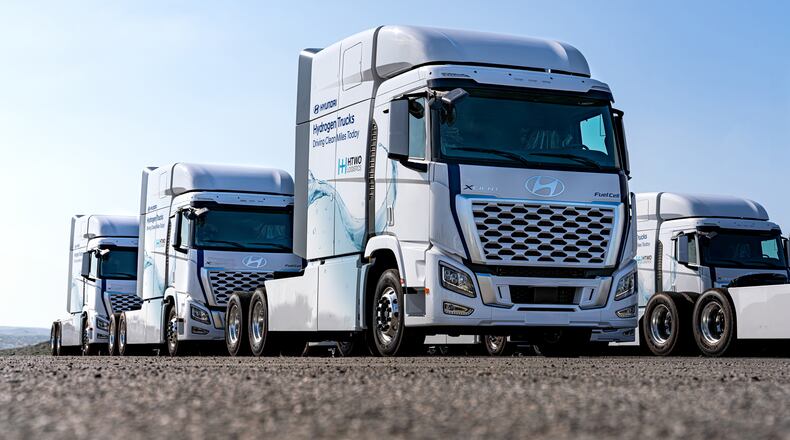Hydrogen may be the most abundant element on Earth, but it’s not commonly seen propelling heavy-duty vehicles in the U.S.
But hydrogen-powered semis with a recognizable logo will soon be darting up and down the freeways along Georgia’s coast.
Hyundai Motor Group announced Wednesday it deployed 21 of its XCIENT hydrogen fuel-cell electric trucks in Georgia to ferry supplies between the state’s ports and the automaker’s newly opened $7.6 billion electric vehicle factory, which it calls its Metaplant. The fleet of big rigs arrived at the Port of Brunswick in September.
Company executives tout hydrogen power as a game-changer in clean energy shipping and green logistics, and Hyundai’s recently deployed technology is the first step in Georgia’s potential “hydrogen highway.”
“Our Hyundai XCIENT hydrogen fuel-cell trucks that support the Metaplant release zero emissions and offer a cleaner alternative to the traditional freight logistics methods used at other manufacturing facilities,” Oscar Kwon, the Metaplant’s CEO, said in a news release.
Credit: Courtesy Hyundai Motor Group
Credit: Courtesy Hyundai Motor Group
The automaker announced in January it planned to bring its hydrogen-powered trucks to Georgia, mirroring their use at factories in South Korea. The trucks are expected to transport materials between the Savannah port, Hyundai’s growing supplier network across coastal Georgia and the Metaplant in Bryan County, roughly 27 miles inland along I-16.
Hyundai said it plans to deploy hydrogen fuel-cell big rigs in logistics for the plant, as a first step toward establishing the foundation of hydrogen infrastructure. It melds with Georgia leadership efforts to cultivate a market for hydrogen fuel and establish itself as a leader in e-mobility and electric vehicles.
Hydrogen is an abundant element, but to be used as fuel it needs to be isolated from other compounds. The environmental benefits depend on how the hydrogen is produced — about 90% of hydrogen produced today is derived from fossil fuels, while “green” hydrogen is produced using renewable energy. But vehicles fueled by hydrogen produce far fewer tailpipe emissions.
In hydrogen fuel cells like the ones powering the new trucks, hydrogen molecules are split into protons and electrons to create a flow of electricity, much like in a battery.
The XCIENT trucks in Georgia are a partnership with Glovis America, a third-party logistics provider that works with Hyundai and its sister automaker Kia. The 21 big rigs represent more than a third of the Metaplant’s logistics shipping fleet.
Glovis and Hyundai will install a mobile hydrogen refueling station at the Metaplant. A permanent “hydrogen production and refueling station” is under development and will be announced at a later date, the release said.
Credit: Courtesy Hyundai Motor Group Metaplant America
Credit: Courtesy Hyundai Motor Group Metaplant America
After an economic development trip to South Korea in June, Gov. Brian Kemp described zero-emission hydrogen technologies as “futuristic” and the potential next step in Georgia-Korean business partnerships.
José Muñoz, Hyundai North America’s chief executive, said at the Los Angeles Auto Show last month that the Georgia Metaplant is likely the landing spot for the automaker’s growing fleet of alternative-fuel powered vehicles.
“We believe the future is electric, but we know the road to getting there isn’t just powered by one fuel,” Muñoz said.
— Staff writer Drew Kann contributed to this report.
About the Author
Keep Reading
The Latest
Featured




